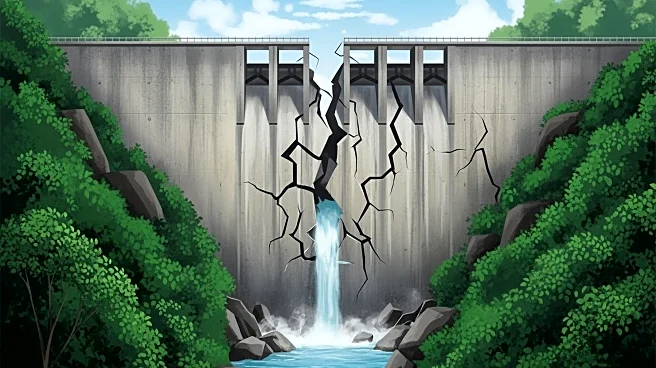What's Happening?
The Democratic Republic of the Congo has suspended operations at a major Chinese-owned copper and cobalt mine following a dam collapse that released contaminated water into Lubumbashi, the country's second-largest
city. The dam, owned by Congo Dongfang International Mining, a subsidiary of Zhejiang Huayou Cobalt Co, released several million cubic meters of electrolytes, flooding homes and potentially contaminating local well water. Environmental experts have raised concerns about the ecological damage and health risks for Lubumbashi's over three million residents. The incident is part of a broader pattern of environmental crises in the Copperbelt region, which spans DR Congo and Zambia.
Why It's Important?
The suspension of the mine operations highlights significant environmental and public health concerns in the region. Lubumbashi, a major city with over three million residents, faces potential long-term ecological damage and health risks due to the contamination. The incident underscores the need for stricter safety standards and oversight in mining operations, particularly those owned by foreign entities. As DR Congo is the world's largest producer of cobalt, essential for electric vehicle batteries, the disruption could impact global supply chains and the country's economic stability. The situation calls for international attention and collaboration to address environmental safety and public health in mining regions.
What's Next?
The DR Congo government is expected to engage with international partners, including the United States, to address the environmental and safety concerns raised by the dam collapse. There may be increased scrutiny and regulatory measures imposed on mining operations to prevent future incidents. The government and environmental groups are likely to push for comprehensive cleanup efforts and long-term monitoring of the affected areas. Additionally, the incident could lead to broader discussions on sustainable mining practices and the role of foreign companies in the region's economic development.
Beyond the Headlines
The dam collapse in Lubumbashi raises ethical questions about the responsibility of foreign companies in ensuring environmental safety and protecting local communities. It highlights the need for transparent and accountable practices in the mining industry, particularly in developing countries. The incident may prompt a reevaluation of the balance between economic growth and environmental protection, influencing future policies and international agreements on resource extraction.









